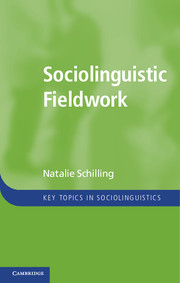1 - Introduction
Published online by Cambridge University Press: 05 April 2013
Summary
Foregrounding Field Methods
Empirical data on language in its social context is at the heart of sociolinguistic study. Nonetheless, researchers have lamented that the field methods whereby such data are gathered have always been rather “inconspicuous” (Feagin 2013: 37). Write-ups of research projects focus on results and interpretations – not on how the data from which the findings are drawn were actually obtained. Indeed, Tagliamonte (2006a: 17) maintains that “fieldwork methods may be the best-kept secret of sociolinguistics.” In addition, the few publications that do focus on sociolinguistic field methods (e.g. Bailey and Tillery 2004; Bailey, Wikle, and Tillery 1997b; Feagin 2013; Labov 1972a, 1984; Macaulay 2009; Milroy and Gordon 2003; Schilling-Estes 2007; Tagliamonte 2006a; Wolfson 1976) all point to the crucial role that research design and method play in shaping the data and, hence, the conclusions we derive. Further, sociolinguistic research foci have both broadened and become more nuanced, and data-related technology of course continues to transform itself every day. Correspondingly, research methods have become more varied and sophisticated and continue to evolve at a rapid pace.
The purpose of this book is to at last reveal the “secrets” of sociolinguistic fieldwork. It is both a how-to for students and researchers who need to design and conduct studies on language in its social context and a thoughtful exploration of the chief methods in sociolinguistic data collection, including examination of which methods work best for which purposes; evaluation of the strengths and weaknesses, advantages and disadvantages of each approach; and consideration of the theoretical assumptions underlying different methodological approaches. The book covers both quantitative and qualitative methodologies, as well as small- and large-scale studies. However, its chief focus is on how a range of methods and perspectives can be applied to variationist sociolinguistics, or quantitative sociolinguistics, the subfield that has dominated modern sociolinguistic study since its inception in the early 1960s. Thus, in addition to providing practical guidelines, the book also explores several recent and ongoing “turns” in current variationist sociolinguistics, including integrating ethnographic study into traditional survey-based methods; and reconsidering traditional conceptualizations of and methods for studying stylistic variation, including investigating variation as it unfolds in interaction. Also of crucial importance throughout the book are questions of fieldwork ethics, including not only consideration of how to ensure that your research causes no harm but also how your research can actually be of benefit to the communities you study.
- Type
- Chapter
- Information
- Sociolinguistic Fieldwork , pp. 1 - 16Publisher: Cambridge University PressPrint publication year: 2013

